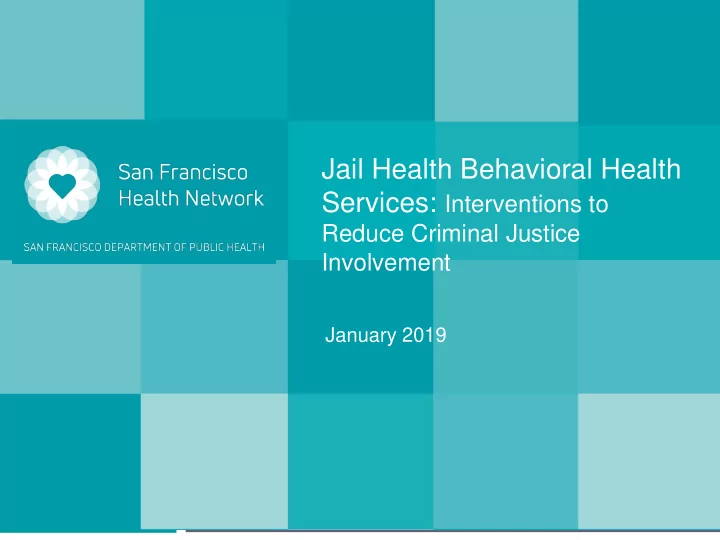

Jail Health Behavioral Health Services: Interventions to Reduce Criminal Justice Involvement January 2019 Title Subtitle 1 1
San Francisco Sequential Intercept Model: Department of Public Health Signature Programs Nurse Family Behavioral Behavioral Partnership Health Court CASC/ Health Court CASC/ LEAD/CASC Offender Offender HOPE SF Treatment Drug Court Drug Court Treatment EMS-6/ Program Program Community-Based Sobering CJC CJC Outreach/Interventions Center MAP PRSPR Jail Health Jail Health Street Medicine CIT Jail Health Services Services TCN Services CRS /SFSVIP AOT MHD 2
Incarceration: a Public Health Issue ▪ Social, economic and environmental determinants of health predict criminal justice involvement ▪ Criminalization of homelessness and poverty, substance use disorders and mental illness leads to incarceration ▪ Physical or mental health issues can lead to unemployment and housing instability ▪ Mental health crises can lead to arrest ▪ Substance use disorders result in poor health outcomes, exacerbated by and contributing to housing instability, fractured social supports and employment instability 3
Determinants of Health Affect Criminal Justice Involvement ▪ Structural and institutional racism lead to over-policing of black communities and disproportionate involvement of people of color throughout the justice system ▪ Environmental toxins such as lead exposure in childhood leads to developmental delays, behavioral issues, and criminal behavior. ▪ Adverse Childhood Experiences, such as exposure to violence in the community, homelessness, or incarceration of a parent, can lead to behavioral issues in school and beyond, substance abuse, as well as mental health disorders. 4
Jail Population Total unique patients: 11,964 (12,329) Incarcerations: 18,667 (18,923) FY 17-18: Average daily census: 1271 ▪ ~7% of unique patients had SMI diagnosis ▪ ~11% of bookings were for those with SMI diagnosis ▪ ~22% of those in jail on any given day have SMI diagnosis Length of incarceration: Average 53 days (range 0 days – 11 years) ▪ 55% (44%) up to 3 days ▪ 69% (59%) up to 7 days ▪ 81% (71%) up to 30 days ▪ 4% (6%) >1 year ▪ 58 people incarcerated > 5 years 5 All data unless otherwise indicated FY17-18 (FY 16-17)
Race/Ethnicity 6
Length of Incarceration: SMI vs non-SMI: 2014-2017 40 35 35 30 Average Days in Custody 24 25 20 20 15 14 10 5 0 No Diagnosis or History Severe Mental Illness Substance Use History Substance Use & Only Severe Mental Illness 7 Budget and Legislative Analysts report
Substance Use Disorders ▪ All patients requiring support for withdrawal (alcohol, opioids, benzodiazepines) receive medication assisted treatment (MAT) ▪ All patients who receive MAT in the community (methadone, buprenorphine, naltrexone) continue this treatment when incarcerated ▪ All patients requiring MAT as condition of release or who request initiation of MAT undergo induction prior to release from the jail ▪ Both individual and group therapy provided JBHS as well as SFSD Programs 8
JHS Organizational Structure Jail Health Services Behavioral Re-Entry & Medical Dental Pharmacy Health HIVIS 9
Jail Health Behavioral Health Services ▪ Mission: ▪ To provide comprehensive, strengths-based behavioral health treatment and linkage to community resources for individuals with mental illness incarcerated in the San Francisco City and County Jail ▪ Principles of Service Delivery: ▪ Integrated medical and mental health services to meet complex patient needs ▪ Recovery and wellness ▪ Trauma-informed care ▪ Linkage to community based services ▪ Patients Served: ▪ 27% referred to JBHS with 71% of this group receiving on-going care 10
Jail Health Behavioral Health Services Levels of Care Non Acute Behavioral Health Screening and Assessment Ongoing Assessment, Individual Treatment and Support, Reentry Planning/Community Linkage Individual, Group and Milieu Treatment, Psychiatric Medication Assessment and Management Crisis Assessment and Suicide Prevention Individuals may move between different levels Psychiatric Hospitalization, of care over dependent Acute Referral to Conservatorship, on their need. Competency Restoration 11
Average Wait for Residential/Locked Treatment from Jail 39% reduction in wait time 140 related to: 120 • Investment in SF Health Center 100 • Collaboration with ZSFG 7L to stabilize patients 80 • Collaboration with courts 60 and community programs to decrease wait times 40 for eligibility assessments 20 0 2015 2018 12
Jail Health Behavioral Health Services: Future Enhancements ▪ Enhance collaboration between medical and behavioral health staff ▪ Multidisciplinary treatment plans ▪ Cross-discipline training ▪ Continue collaboration and training with deputized staff ▪ Crisis Intervention Training (CIT) ▪ Behavioral plan development ▪ Mental Health Diversion (Penal Code section 1001.36) ▪ Expand Reentry Services involving all JHS disciplines: ▪ Peer Support ▪ Community linkages ▪ Inside/out models of care 13
Recommend
More recommend